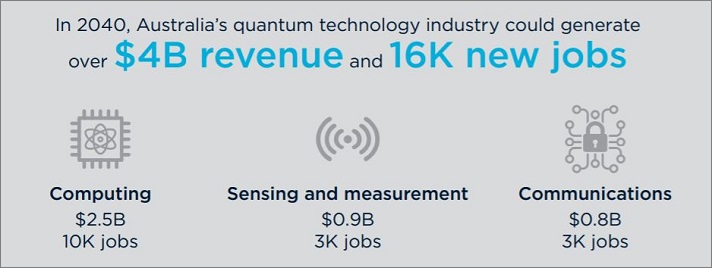Quantum technologies are set to create 16,000 new Australian jobs over the next 20 years and will become a key part of the country's technology sector, according to a new report from the CSIRO.
CSIRO’s Growing Australia’s Quantum Technology Industry report offers a roadmap aimed at helping Australia’s already emerging quantum ecosystem become a global high-tech powerhouse.
CSIRO CEO, Dr Larry Marshall, said a push for quantum research and development (R&D) would help drive economic advantage as the world begins to re-emerge following the coronavirus crisis.
“As Australia recovers from the impacts of COVID-19, we will need to create new industries to give Australia an unfair advantage globally to produce unique high margin products that support higher wages,” Dr Marshall said.
“Science and technology are the key to economic prosperity in a world driven by disruption.”
Quantum computers have already been pegged for improving drug and material development through chemical simulations that far exceed the capability of classical computers.
The technology could also provide a higher level of security for critical infrastructure with quantum cryptography set to become a necessity for encryption as quantum computers become more powerful.
And CSIRO expects the production of quantum sensors to aid valuable mineral exploration that already underpins the Australian economy.
Staying competitive
The CSIRO report outlines an existing quantum ecosystem that includes 22 world-class research institutions and 16 quantum-related companies around the country.
Phil Morle, partner at Main Sequence Ventures – the CSIRO’s venture capital fund – said investors are already whetting their appetites for quantum technology.
“As global competition heats up, Australia already has several early stage companies and start-ups built upon IP and expertise developed in Australian universities that have attracted over $125 million of investment and funding in recent years,” Morle said.
“Main Sequence invests in deep-tech start-ups because they are truly transformative, and quantum is exactly the transformative technology the economy needs at a time like this.”
Quantum computing alone could create 10,000 new jobs. Source: CSIRO
Some investors would have already seen return on quantum-related investment when Archer Materials announced it was accepted into the IBM Q Network to continue work on its quantum computing hardware.
Archer’s share price more than doubled off the back of that announcement.
But for more of these quantum ventures to become economically viable, the CSIRO envisages a national approach to ensure early-stage R&D grows into fully-fledged, marketable products.
As well as the development of a “national quantum technology strategy”, the CSIRO wants to see Australia’s industrial capabilities improved to prepare for the new technology by training and retaining “the best quantum talent”.
In an article for The Conversation, CSIRO’s Chief Scientist, Cathy Foley, and Science and Technology Consultant, Dominic Banfield, also expressed a need for more government investment in order for Australia to cross over the "valley of death” with quantum computing.
“It’s a long way from a technically proven technology to a successful commercial application. The gap between the two is often referred to as the ‘valley of death’,” Foley and Banfield wrote.
“Australia often has trouble crossing this valley, where many of our innovations seem to wither. We need a concentrated effort to help our research make it through.”
“We need new ways to help universities and researchers navigate the valley, and support the prototypes, testing and marketing needed to get ideas off the bench. Investment in purpose-built facilities to help this process will help create the new markets and new jobs we need.”
Major league players
For Australia to become a major player in an emerging global quantum economy over the next 20 years, it will have to compete against or work with the likes of US technology giants which are already leading the way.
Just last year, Google claimed ‘quantum supremacy’ after running a fit-for-purpose computation with its 54-qubit ‘Sycamore’ processor that would have apparently taken the fastest classical computer 10,000 years to run.
IBM Quantum and Amazon Braket currently let developers experiment with quantum and hybrid programming through the cloud – a move echoed by massive technology producer, Honeywell, which unveiled what it said is the world's most powerful quantum computer in March.











